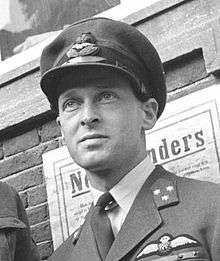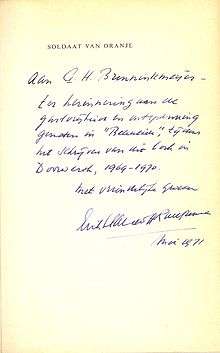Erik Hazelhoff Roelfzema

Siebren Erik Hazelhoff Roelfzema RMWO DFC (3 April 1917 – 26 September 2007) was a Dutch wartime RAF-pilot, Dutch spy and writer. He was a Knight 4th class of the Military William Order.
In the Netherlands he became famous as the writer of the 1970 book Soldaat van Oranje (Dutch: Soldier of Orange) in which he describes his experiences in World War II, and which was made into a 1977 film directed by Paul Verhoeven and starring Rutger Hauer.
Early life
Hazelhoff was born in Surabaya, on Java in the Netherlands East Indies (now Indonesia), the son of Siebren Erik Hazelhoff Roelfzema, senior, and Cornelia Vreede. His family moved to The Hague in the 1930s, and then Wassenaar. He travelled to the US in 1938, writing a book of his experiences in 1939, Rendezvous in San Francisco.
He was a law student at Leiden University when the Second World War broke out. He joined the Dutch army reserve, and became involved in the underground (Resistance during World War II) after Germany occupied the Netherlands. He managed to escape to the United Kingdom as a crew member aboard the SS St. Cergue, a Swiss merchant ship in June 1941, together with Bram van der Stok, Peter Tazelaar, Gerard Volkersz. and Toon Buitendijk.
Secret agent
In London, Hazelhoff Roelfzema, with the help of general François van 't Sant, director of the Dutch CID (Central Intelligence Service) and Col. Euan Rabagliati (Secret Intelligence Service) set up a secret service group known as the Mews, after Chester Square Mews where they lived in London. The goal was to establish a contact with the Resistance in the Netherlands. Several agents were parachuted, others were put ashore at the beaches of Noordwijk and Scheveningen. Roelfzema did not receive much cooperation from the Dutch government, and Van 't Sant was forced to transfer control over the CID to Colonel Mattheus de Bruyne of the Dutch Marine Corps.
De Bruyne did not do a good job. He failed to recognize the fact that his agents were arrested and continued to broadcast messages – for the Germans. The usual procedure for transmitting messages was to include small errors. If an agent was forced to work for the Germans, he would leave out the errors. The result should be that contact was aborted immediately. De Bruyne, however, concluded that the agents simply forgot to use the security-checks and even sent messages to remind them. Other intelligence blunders were the maps he had attached to the wall in his London office, showing the landing sites of Noordwijk, Scheveningen and Walcheren in full detail.
Hazelhoff Roelfzema and De Bruyne did not get on. De Bruyne threatened to court-martial him for ignoring an order – at the same time Hazelhoff Roelfzema was proposed for the Willemsorde (the highest military decoration in the Netherlands). He was awarded the Willemsorde (Knight, 4th class) in 1942: the court-martial was cancelled after a meeting with Dutch Navy minister Furstner.
The 1979 history of the Special Operations Executive network in the Netherlands by M. R. D. Foot has confirmed the degree of German penetration of SOE's Dutch networks, something SOE denied during the War. The British intelligence effort in the Netherlands was penetrated throughout the war, from the capture of two SIS agents, Captain Sigismund Payne Best and Major Richard Stevens in the Venlo Incident in November 1939, to the capture of some 50 British and Dutch agents by the Abwehr and the Sicherheitsdienst in Operation North Pole.
Royal Air Force
Hazelhoff Roelfzema became frustrated by the treatment and joined the Royal Air Force in 1942. He attended flying school in Canada, where he became the best pilot cadet of his group.
He returned to England in 1944, and joined No. 139 Squadron RAF, part of the elite Pathfinder Force, tasked with illuminating targets for the night bombers of RAF Bomber Command. He made 72 sorties in Mosquito bombers, of which 25 went to Berlin, and was awarded the Distinguished Flying Cross.
Adjudant to the Queen
In April 1945, Hazelhoff Roelfzema was appointed adjudant (assistant) to Queen Wilhelmina. He accompanied her back to the Netherlands in May 1945, and piloted the airplane in which Princess Juliana, Prince Bernhard and their daughter Princess Beatrix flew back to the Netherlands. Hazelhoff Roelfzema helped Beatrix walk her first steps on liberated Dutch soil.
After the war

Hazelhoff Roelfzema led a fairly restless life after the war, including a stint in Hollywood as an actor and then a writer. During the 1950s he worked as a writer for NBC's Today Show and Tonight Show in New York City. He later wrote for Dutch newspapers. He was appointed director of Radio Free Europe in Munich in 1956. Later he was involved in a failed attempt by the CIA to support the South Moluccas Republic's bid for independence from the rule of Indonesian dictator Sukarno.[1] He was involved in the creation of Racing Team Holland, attracting sponsors using his fame. His book Soldier of Orange (Soldaat van Oranje), published in 1970, relates his adventures during the war and the political turmoil of the Dutch government in exile. It attracted a lot of attention, even more so when it was made into a film by Paul Verhoeven in 1977, starring Rutger Hauer as Hazelhoff Roelfzema. The film brought Verhoeven, Hauer and Hazelhoff Roelfzema to wider public attention outside the Netherlands, and was nominated for a Golden Globe.
In 1980, Hazelhoff Roelfzema played a ceremonial role as one of two kings of arms at the coronation of Queen Beatrix. He was close to Prince Bernhard of the Netherlands, whom he entertained frequently at his home in Maui.
He moved to Hawaii in early 1973, and joined energy company Barnwell Industries Inc. as a director in 1977. He wrote a second autobiography, In Pursuit of Life, in 2000. He died on 26 September 2007 at his home in Āhualoa near Honokaʻa, on the Island of Hawaiʻi, at the age of 90.[2] He is survived by his wife, Karin Steensma, daughter, granddaughter, great granddaughter and great grandson.
In November 2015, it became known from the upcoming biography of François van't Sant, a trusted advisor to Queen Wilhelmina, that Hazelhoff Roelfzema together with others had planned a coup in 1947 to overthrow the democratically elected Dutch government out of disagreement with the Linggadjati Agreement, an accord between the Dutch government and the unilaterally declared Republic of Indonesia recognizing Republican rule over major parts of Indonesia under the Dutch crown.[1]
References
- 1 2 "Cookies op Trouw.nl". Retrieved 13 August 2016.
- ↑ Dennis Hevesi (8 October 2007). "Erik Hazelhoff Roelfzema, a 'Soldier of Orange,' Is Dead at 90". New York Times. Retrieved 10 September 2010.
External links
| Wikimedia Commons has media related to Erik Hazelhoff Roelfzema. |
- Obituary, Honolulu Advertiser, 28 September 2007
- Erik Hazelhoff Roelfzema at the Internet Movie Database
- Obituary, The Times, 1 October 2007
- Obituary, The Guardian, 15 November 2007
- Literary Prize, Erik Hazelhoff Prijs, 5 September 2009